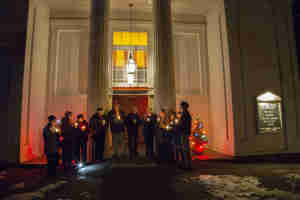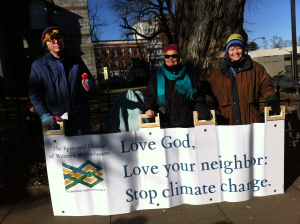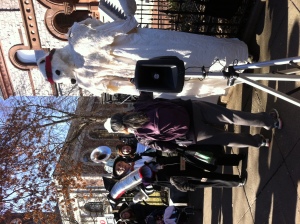Facing the climate crisis and abiding in love
It’s a pleasure to be with you this morning and to reconnect with some dear clergy friends whom I’ve known for many years. Thank you for inviting me to preach. I work as the Missioner for Creation Care in the Diocese of Western Massachusetts, and I travel to different churches, preaching the Gospel and speaking about our call as Christians to honor the holiness of God’s Creation. I know that caring for Creation is a topic that many of you are already concerned about here at St. Paul’s, and I hope to give you a word of encouragement and support.
Today’s Gospel reading makes a fine starting-point for reflection on why Christians feel called to protect God’s Creation. When I was in seminary many years ago, someone told me that a preacher should never mention the word ‘love’ in a sermon unless the readings assigned for the day clearly justified it. It turns out that I’ve managed to ignore that advice for nearly 30 years in just about every sermon I’ve ever preached. But hey – today I need no excuse! I did the count: the word “love” shows up nine times in today’s Gospel: Jesus says to his disciples, “As the Father has loved me, so I have loved you; abide in my love. If you keep my commandments, you will abide in my love, just as I have kept my Father’s commandments and abide in his love… This is my commandment, that you love one another as I have loved you” (John 15:9-10, 12). And so on. The reading from the First Letter of John mentions the word ‘love’ five times. So today I get to proclaim it, no excuses, no hand on the parking brake, and no holds barred: it’s all about love and it’s always been about love. We live in the midst of the great love affair going on between God and God’s Creation. From start to finish, the whole Christian story is a story about a divine love that creates and sustains, that heals and forgives, that brings forth new life and makes all things new. There is a divine Presence within us and among us that is always luring us to connect and to be gentle with each other, always inviting us to be compassionate, always challenging us to confront injustice and to overcome division until at last we create the Beloved Community for which God yearns. Divine love has no limit. It embraces not only human beings but also all beings (Genesis 9:12). And the love of God being poured into our hearts through the Holy Spirit (Romans 5:5) gives us strength to protect an imperiled world and to work for its healing and transformation. Today is Mother’s Day, and I give thanks for the mothers who brought each of us into the world, for those in this room who are mothers, for those trying to become mothers and those wishing they had been mothers, and for everyone, men and women alike, who know what it’s like to love with a mother’s love and to pour ourselves out – sleepless nights and all! – in the effort to help another being thrive. We sometimes describe our planet as Mother Earth, so today is a good day to honor her, too – this all-embracing Earth that offers us nourishment, shelter, and life. Today we also acknowledge our planet’s vulnerability and the assault now being waged on our planet’s life-systems. Of all the environmental challenges that we face, it is climate change that wakes me up in the middle of the night. I know that some people are very concerned about climate change, and some people less so. As I see it, climate change is the moral issue of our time. 97% of climate scientists worldwide are telling us with increasing alarm that climate change is real, it is happening now, and for the most part it is caused by us human beings. Of course there has always been some natural variability in the planet’s average temperature, but ever since the Industrial Revolution we’ve been forcing the climate to change in a way that human beings have never experienced before. In just two centuries – only a blink in geologic time – we have burned so much coal, gas, and oil and released so much heat-trapping carbon dioxide into the atmosphere that levels of carbon dioxide in the atmosphere are at a level that Homo sapiens has never experienced before. A few days ago, the National Oceanic and Atmospheric Administration made an expected, though long-dreaded, announcement that for the first time in human history the global level of carbon dioxide has topped 400 parts per million, reaching a level that hasn’t been seen in about 2 million years. For now the air is still breathable, and for now your life and mine will go on. But what’s so worrisome to scientists is that this process is happening so fast. Already we’ve shot well past 350 parts per million, the safe upper limit for carbon dioxide in the atmosphere, and the amount of carbon dioxide pouring into the atmosphere is accelerating at a record pace, one hundred times faster than natural rises in the past. Already oceans are heating and becoming more acidic; tundra is thawing; ice caps are melting; sea levels are rising; coral reefs are dying; massive droughts are spreading in some places and heavy rains intensifying in others. Last spring we learned that the huge West Antarctic ice sheet is starting to collapse and slide into the sea in a way that scientists call “unstoppable.” Here in New England, extreme weather events have increased over 70% in recent years, and you know first-hand about Hurricane Sandy. So when it comes to the climate crisis, it’s not just about polar bears anymore. It’s about saving a habitable world for our children and our children’s children. It’s about finding our moral compass and deciding what kind of world we want to inhabit. The average worldwide temperature is rising, and if we simply stick to business as usual and keep to our present course – if we simply keep carrying out our usual daily activities in our usual carbon-intensive way – then within two, three, four generations we could raise average global temperatures to a level that would make the world very difficult for humans and other creatures to inhabit. So how does the Holy Spirit call us to respond as the web of life unravels before our eyes? In a situation that speaks so much of death and despair, it is deeply reassuring to hear Jesus call us to abide in his love. The melting of the West Antarctic ice sheet may be unstoppable, but so, too, is the love of God. We take heart from that unstoppable love. We know that God is with us. We know that when we rise up to heal God’s Creation, we are becoming the people that God created us to be: people who bless and heal the Earth, people who refuse to settle for business as usual. Scientists have done their work. Now it’s up to us to bear witness to the love of God. And that’s just what’s happening in religious communities around the world, especially now, as we look ahead to the crucial U.N. climate talks that will take place in Paris this December. In March, the Episcopal Church organized a webinar on the climate crisis and our Presiding Bishop declared that denying the reality of human-caused climate change is immoral. Last week Pope Francis and top Vatican officials met with the head of the U.N. and with leading climate scientists to frame climate change as a moral issue, and around the world people are waiting with great anticipation for the release this summer of a papal encyclical on climate change. The Church of England announced last week that it is divesting – that is, selling off its holdings of stocks and bonds – from two of the most polluting fuels, coal and tar sands, for it is immoral to burn up the planet, surely it is immoral to profit from that burning. The World Council of Churches, the Unitarian Universalist Association, and the United Church of Christ have already announced that they are divesting from fossil fuels, as have a number of dioceses in the Anglican Communion and several dioceses in the Episcopal Church. I hope that the Episcopal Church as a whole will decide at General Convention this summer to follow suit; the Rev. Stephanie Johnson1 and I are part of a small group of people pushing to make that happen. A wave of religious activism, including, in some cases, civil disobedience, is beginning to sweep the country, as religious leaders and institutions start to speak out that climate change is not just a scientific issue, not just economic issue, not just a political issue, but also a moral issue. For I ask you – is it ethical to ruin the world for our children and grandchildren, and for generations yet unborn? Do we have no moral responsibility for the cascade of extinctions now underway among our brother and sister species, in large part because of climate change? Are we willing to stand idly by and devastate the lives of the poor, who suffer first and hardest from the effects of climate change? Are we willing to thumb our noses at our Creator, who entrusted the Earth to our care and to whom the Creation ultimately belongs (Psalm 24:1)? Will we refuse to bear witness in our lives that “God so loved the world that he gave his only Son, so that everyone who believes in him may not perish but may have eternal life” (John 3:16)? For more and more of us, the answer, thank God, is No. We want to abide in God’s love. We want to be faithful to Jesus. We want the love that is pouring through us to be expressed in how we treat each other and how we treat the Earth. And there is so much we can do. As individuals, we can recycle more, drive less, be sparing in our use of water, and quit using bottled water. We can turn off lights when we leave a room, maybe eat local, organic, and less meat-centered foods, and support local farms and land trusts. As a congregation you can form a “green team,” and if you visit my Website, RevivingCreation.org, you can download a short piece that explains how to do that. Above all, by sounding the moral call we can join the climate movement and push to make it politically possible to do what is scientifically necessary. We need to make a swift transition to clean, safe, renewable sources of energy, such as sun and wind. Interfaith initiatives to address the climate crisis are being organized right here in the Fairfield area, and I hope that you will join me for a conversation about that after the service. I hope that some of you will join me on September 20 in Washington, D.C., where people will converge for the Moral March for Climate Action. I hope that this march will be as powerful and as decisive as the March on Washington in 1963. The love of God will guide us. Churches can lead the way. With the blessing of God the Father, in the presence and power of the risen Christ, and inspired by the Holy Spirit, our churches can become centers of prayer and action for a more sustainable, just and prosperous world. Thank you, good people of St. Paul’s, for everything you are already doing and for what you will decide to do in the weeks and months ahead. ______________________________________________________________________________________________________ 1. Assistant Priest for Children and Youth Formation at St. Paul’s, the Rev. Stephanie Johnson is also convener of New England Regional Environmental Ministries.

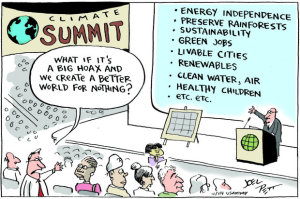
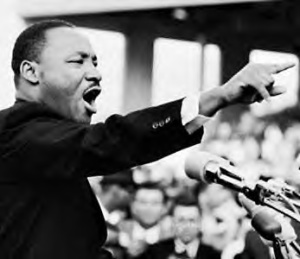 It is God who whispers that dream into our hearts, God who plants that longing in us like a seed that grows into a mighty oak, God who stirs us out of our complacency and sends us into action. It is God who gives us a heart to care, and strength to keep fighting the good fight. For it can be difficult to keep going, difficult to keep the faith in the face of sometimes brutal opposition and the sheer inertia of business as usual.
There is a wonderful scene in the movie
It is God who whispers that dream into our hearts, God who plants that longing in us like a seed that grows into a mighty oak, God who stirs us out of our complacency and sends us into action. It is God who gives us a heart to care, and strength to keep fighting the good fight. For it can be difficult to keep going, difficult to keep the faith in the face of sometimes brutal opposition and the sheer inertia of business as usual.
There is a wonderful scene in the movie 